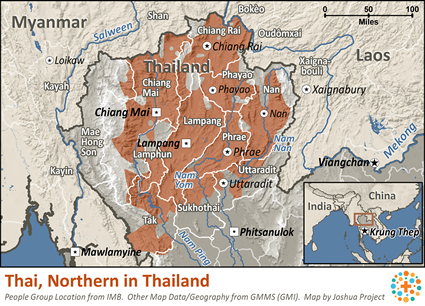The traditional center of Northern Tai culture is the city of Chiang Mai. Chiang Mai was formerly the capital of the Lanna ('Million Rice-fields) Kingdom, which at the height of its power extended across north-central Thailand to include Luang Prabang and Vientiane. Lanna was finally overcome by the Siamese and politically incorporated into today's Thailand in 1895. There were many years of hostility between the kings of Lanna and Siam before the former was finally subdued. In the 1770s, Chau Prasat Tawng, the King of Siam, "laid the country waste, plundered their villages, and brought away many thousand captives to be slaves forever more. The King of Laos...was betrayed into the hands of the Siamese, arriving in Bangkok about the close of the year 1828. He underwent cruelties of which it is a shame even to speak...He was confined in a large iron cage, exposed to the burning sun, and obliged to proclaim to everyone that the King of Siam was great and merciful, that he himself had committed a great error and deserved his present punishment. In this cage were placed with the prisoner a large mortar to pound him with, a larger boiler to boil him in, a hook to hang by, and a sword to decapitate him; also a sharp-pointed spike for him to sit on. His children were sometimes put in along with him."
Tai Yuan, or Northern Tai speakers, live in several different locations in Laos, but they are much more numerous in Thailand. The Northern Thai traditionally have their own script, in which the Bible was translated in 1927. Few people today, however, can read it. The JESUS Film was completed in Tai Yuan, giving hope that the unevangelized Northern Thai in Laos may soon hear the gospel.
With their large numbers in Thailand, it is impossible to generalize about the lifestyle of the Northern Thai people. Some are involved with traditional agriculture while others live in cities where they live modern lives.
The Northern Thai practice Buddhism, the major world religion based on the teachings of Siddhartha Gautama or the Buddha, who lived in the 6th and 5th century BC in ancient India. The Buddha taught the Four Noble Truths by which one can gain spiritual knowledge and escape the endless cycles of reincarnation. Theravada, one of the two major branches of Buddhism, declares that by following the Noble Eightfold Path of right intentions and right actions that a Buddhist can achieve nirvana or a state of freedom and salvation. Mahayana Buddhism, the other main branch of Buddhism, asserts that by following the six perfections that a Buddhist can move along the path to Enlightenment. Tibetan Buddhism falls within the Mahayana school.
To most Buddhists, however, these things have far less meaning than their traditional beliefs, which are usually animistic. In animism, evil spirits must be appeased through prayers, sacrifices and rituals. Buddhism allows people to mix Buddhist teachings with traditional religion.
Two of the important Buddhist yearly holidays are Vesak, the Buddha's birthday celebrated in May or June and Bodhi Day, the holiday which commemorates the day that the historical Buddha experienced enlightenment under a Bodhi tree.
The Northern Thai people need the desire to seek and find the savior who offers life to the full. They need a holy dissatisfaction with traditional spiritual answers.
Pray the Northern Thai JESUS Film would become readily available to the Northern Thai people.
Pray the things keeping the Northern Thai from salvation would be cast down.
Ask God to send Northern Thai Christians from Thailand to reach their cousins in Laos.
Pray for spiritual discernment and hunger among the Northern Thai people in Thailand and Laos.
Scripture Prayers for the Thai, Northern in Thailand.
Peoples of Laos, Asia Harvest, Copyrighted © Used with permission
| Profile Source: Joshua Project |


























